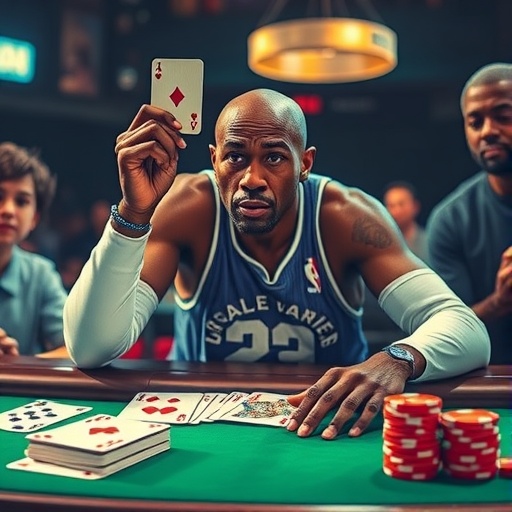NBA Poker Scandal Rocks Sports Betting World as Legal Gambling Hits $10 Billion in 2025
In a bombshell that has sent shockwaves through the world of professional basketball and beyond, a high-stakes NBA poker scandal has unraveled, exposing the shadowy intersections of gambling and elite athletics. As legal sports betting surges to a staggering $10 billion in revenue through the first nine months of 2025, this revelation underscores the precarious balance between booming industry profits and the lurking dangers of illicit activities. At the center of the storm is a prominent NBA player whose alleged involvement in underground poker rings has raised alarms about match-fixing, debt-driven corruption, and the blurred lines between legal wagers and criminal enterprises.
- The High-Stakes Unraveling of the NBA Poker Scandal
- Sports Betting Industry Surges to $10 Billion Amid Rising Concerns
- FanDuel’s Bold Statement on Legal vs. Illegal Gambling Frontiers
- NBA’s Swift Actions and the Ripple Effects on League Integrity
- Navigating the Future: Reforms and the Path Ahead for Sports Betting
The scandal broke late last week when federal investigators, in coordination with the NBA’s integrity unit, raided several high-end poker dens in Las Vegas and Atlantic City. Sources close to the investigation revealed that the player, whose identity remains under wraps pending formal charges, had accrued massive debts from high-stakes poker games, potentially leading to compromised game decisions. This isn’t just a personal failing; it’s a stark reminder of how the explosion in sports betting—fueled by apps like FanDuel—has amplified vulnerabilities in professional sports.
Legal sports betting, legalized in more states since the 2018 Supreme Court decision, has transformed into a juggernaut. According to the American Gaming Association (AGA), wagers placed through regulated channels reached $10 billion by September 2025, a 25% increase from the same period in 2024. Yet, this glittering facade hides a darker underbelly, where illegal gambling operations thrive, preying on athletes and fans alike. FanDuel, one of the industry’s leaders, issued a statement emphasizing the safeguards of legal platforms, contrasting them sharply with the chaos of underground markets.
The High-Stakes Unraveling of the NBA Poker Scandal
The NBA poker scandal ignited when whispers of irregular betting patterns surfaced during the 2024-2025 season playoffs. Oddsmakers at major sportsbooks noticed anomalous line movements on several games involving the implicated team, prompting a deeper probe by the league’s betting monitoring team. What began as a routine audit quickly escalated into a full-blown investigation after tips from informants pointed to underground poker sessions frequented by NBA stars.
Details emerging from the raids paint a picture of a clandestine world where poker, long a staple of gambling lore, intersects perilously with sports betting. The player in question reportedly lost over $500,000 in private games over six months, debts that sources say were partially settled through favors from shady bookies. These bookies, operating outside legal frameworks, allegedly pressured the athlete to share insider information on game outcomes, blurring the lines between poker losses and sports betting manipulations.
“This is the tip of the iceberg,” said Dr. Elena Vasquez, a gambling addiction expert at the University of Nevada, Las Vegas. “NBA players, with their high profiles and disposable incomes, are prime targets for illegal operators who see them as gateways to influencing sports betting outcomes.” Vasquez’s research, published in the Journal of Gambling Studies, highlights how 15% of professional athletes in major leagues have engaged in non-regulated gambling, a figure that has spiked with the rise of mobile betting apps.
The scandal’s tentacles extend beyond the individual. Federal documents unsealed this week mention connections to organized crime syndicates in the Northeast, who used poker as a front to launder money from illegal sports betting pools. One affidavit details how bets on NBA games were funneled through these rings, with odds manipulated to favor underground parlays. The NBA, already scarred by past controversies like the 2007 Tim Donaghy referee scandal, now faces its most significant gambling crisis since the league partnered with betting firms in 2019.
To contextualize the severity, consider the financial stakes: The global sports betting market is projected to hit $182 billion by 2028, per Statista, with NBA games accounting for a hefty slice due to their fast-paced action and star power. But when scandals like this erupt, they erode trust. FanDuel, which reported $3.2 billion in revenue for Q3 2025 alone, has seen its stock dip 4% in the wake of the news, as investors worry about regulatory backlash.
Sports Betting Industry Surges to $10 Billion Amid Rising Concerns
While the NBA poker scandal casts a pall, the broader sports betting landscape is awash in green. Legal wagers in the U.S. have ballooned since the repeal of the Professional and Amateur Sports Protection Act (PASPA) in 2018, with 38 states now offering regulated markets. The AGA’s latest report shows that through September 2025, bettors placed $10 billion in legal sports bets, generating $920 million in tax revenue for states—a boon for public services but a magnet for opportunists.
NBA betting has been a cornerstone of this growth. Leagues like the NBA have embraced partnerships with operators such as FanDuel and DraftKings, integrating in-game betting into broadcasts to boost engagement. During the 2025 playoffs, NBA-related wagers alone topped $2.5 billion, according to Eilers & Krejcik Gaming. This influx has created jobs—over 200,000 in the industry—and funded community programs, but it hasn’t come without strings.
The poker scandal highlights a critical divide: While legal sports betting platforms enforce strict KYC (Know Your Customer) protocols and age verification, illegal markets operate in the shadows. Underground poker games, often held in private clubs or online dark web sites, bypass these safeguards, allowing debts to spiral unchecked. A 2024 FBI report estimated that illegal gambling in the U.S. still exceeds $150 billion annually, dwarfing legal figures and fueling crimes from money laundering to extortion.
Statistics underscore the NBA’s vulnerability. A survey by the National Council on Problem Gambling found that 6% of NBA fans exhibit signs of gambling addiction, compared to 2% in the general population. Players, under immense pressure, are not immune; the league’s own wellness program has seen a 30% uptick in gambling-related counseling sessions since 2023.
- Key Stats on 2025 Sports Betting Growth:
- $10 billion in legal wagers through Q3, up 25% YoY.
- NBA games drove 20% of total handle, per AGA data.
- FanDuel captured 42% market share, with $4.2 billion in total bets.
- Illegal betting losses estimated at $50 billion nationwide.
Experts like Mark Cuban, Dallas Mavericks owner and vocal betting advocate, have long warned of these risks. In a recent podcast, Cuban stated, “Legal sports betting is a win for fans and leagues, but we can’t ignore the illegal side. Scandals like this NBA poker mess show why regulation must evolve faster than the market.”
FanDuel’s Bold Statement on Legal vs. Illegal Gambling Frontiers
FanDuel, the beleaguered giant of sports betting, wasted no time distancing itself from the NBA poker scandal. In a press release issued Monday, the company highlighted its commitment to integrity, noting that all bets on its platform undergo real-time monitoring by third-party auditors. “The contrast between our regulated ecosystem and the illegal underbelly exposed in this scandal couldn’t be clearer,” said FanDuel CEO Amy Howe. “Legal sports betting protects users with tools like deposit limits and self-exclusion, while underground operations like these poker rings exploit vulnerabilities.”
This stance is more than PR spin; FanDuel has invested heavily in anti-fraud tech. The platform uses AI algorithms to detect suspicious patterns, such as rapid line movements or correlated betting from IP addresses tied to known illegal networks. In 2025 alone, FanDuel flagged and reported over 5,000 potential irregularities to authorities, including ties to the very poker dens raided in the NBA case.
Yet, the scandal has implications for FanDuel’s NBA partnerships. The company holds naming rights for the FanDuel Sportsbook at several arenas and runs official league betting promotions. Critics argue that such deep integrations glamorize gambling, potentially drawing players toward riskier behaviors. “When stars endorse betting apps, it normalizes the thrill, but scandals remind us of the addiction’s dark side,” noted Sarah Thompson, director of the Responsible Gambling Council.
FanDuel’s response includes a $10 million pledge to athlete wellness programs, focusing on gambling education for NBA players. This move aligns with broader industry efforts: DraftKings announced similar initiatives last month, and MGM Resorts is lobbying for federal standards on sports betting advertising. As the poker scandal unfolds, FanDuel’s emphasis on legality could bolster its position, but it also spotlights the need for unified oversight.
From a business angle, the $10 billion milestone is a testament to FanDuel’s dominance. The company’s user base grew 18% in 2025, driven by NBA futures bets and live in-game wagering. However, with scandals eroding confidence, FanDuel’s marketing now pivots to safety features, such as its “GameSense” program, which promotes responsible play through pop-up reminders and spending trackers.
NBA’s Swift Actions and the Ripple Effects on League Integrity
The NBA’s reaction to the poker scandal has been decisive, reflecting lessons from past gambling woes. Commissioner Adam Silver suspended the implicated player indefinitely on Sunday, pending a full investigation by the league’s Joint Player Management Council. “Protecting the integrity of our game is paramount,” Silver said in a league-wide memo. “This incident, tied to illegal gambling, demands transparency and accountability from everyone involved.”
Behind the scenes, the NBA is ramping up its surveillance. The league’s partnership with Genius Sports for betting data analytics will now include poker-related monitoring, scanning for cross-over patterns between card games and sports wagers. Additionally, all players will undergo mandatory gambling education refreshers this offseason, covering topics from debt management to recognizing predatory bookies.
The ripple effects are already felt across the NBA. Sponsorship deals with betting firms are under scrutiny; while FanDuel remains a partner, clauses allowing termination for integrity breaches are being invoked in contract reviews. Fans, too, are reacting—social media buzz around #NBAPokerScandal has surpassed 500,000 mentions, with many calling for stricter bans on athlete gambling.
Broader implications touch on labor dynamics. The NBA Players Association (NBPA) is negotiating enhanced support in the next collective bargaining agreement, including confidential hotlines for gambling concerns. “Players are under constant pressure; this scandal shows we need better safeguards,” said NBPA executive director Michele Roberts.
Economically, the scandal could dent NBA revenues. Ticket sales and merchandise might suffer if trust wanes, and international markets—where betting is tightly controlled—may hesitate on expansions. Yet, the league’s proactive stance could turn the tide, positioning the NBA as a leader in sports integrity.
- Steps the NBA is Taking Post-Scandal:
- Indefinite suspension of the involved player.
- Enhanced monitoring of betting and gambling activities.
- Mandatory education programs for all rostered athletes.
- Collaboration with federal agencies for ongoing probes.
Navigating the Future: Reforms and the Path Ahead for Sports Betting
As the dust settles on the NBA poker scandal, the sports betting industry stands at a crossroads. With legal gambling poised to exceed $150 billion globally by 2030, regulators are eyeing comprehensive reforms. The Biden administration has signaled interest in federal oversight, potentially standardizing rules on athlete endorsements and cross-state betting to curb illegal spillovers.
For the NBA, the scandal is a wake-up call to fortify defenses. League officials are in talks with Congress about expanding the Wire Act to cover online poker hybrids that influence sports outcomes. FanDuel and peers are lobbying for these changes, arguing that stronger laws would protect their markets from underground competition.
Looking ahead, experts predict a more bifurcated industry: Legal sports betting will innovate with blockchain for transparent wagers, while crackdowns on illegal gambling intensify. Initiatives like the NCAA’s recent ban on prop bets in college sports could extend to pros, limiting high-risk wagers that tempt corruption.
In the words of gambling policy analyst Jordan Goldstein, “The $10 billion milestone is impressive, but scandals like this NBA poker affair remind us that unchecked growth breeds risks. The future lies in balancing innovation with ironclad integrity.” As investigations continue, the NBA and its partners must act swiftly to preserve the game’s purity, ensuring that the thrill of sports betting enhances, rather than undermines, the sport we love.
The path forward includes international cooperation, too. With NBA games broadcast worldwide, alliances with bodies like the UK’s Gambling Commission could standardize global standards. For fans, this means safer betting environments; for players, better support against gambling’s pitfalls. Ultimately, turning this scandal into a catalyst for positive change could redefine the industry’s trajectory, making 2025 not just a year of records, but of reckoning and renewal.








